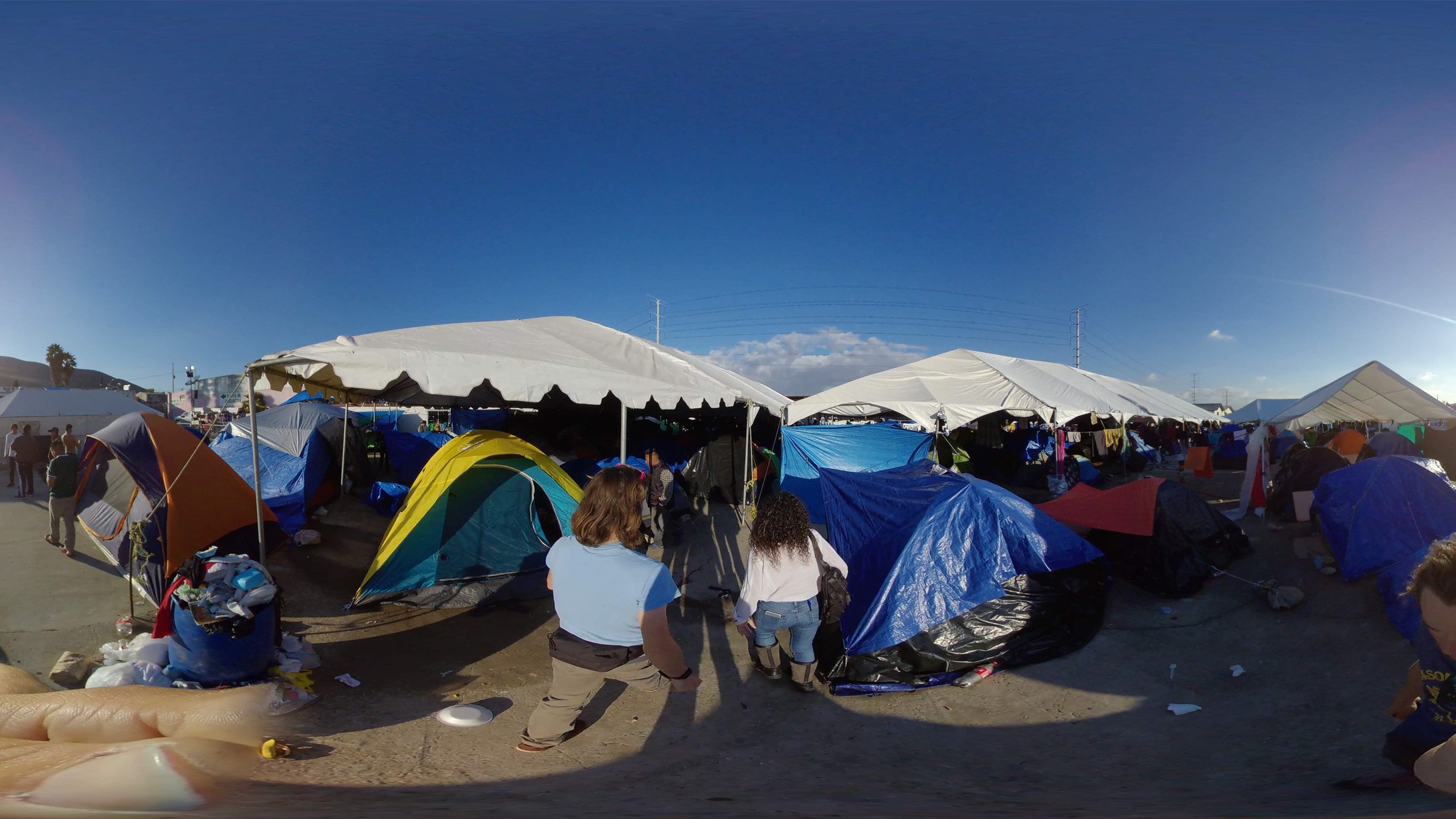On our first visit to the border, the people there needed everything. The Mexican government had wanted the people who had been much-demonized as “The Caravan” to move to a new refuge that had been set up, so they took away their water. We sneaked around a police cordon and asked people what we could do, what they needed; we came back with supplies in the back of a pickup truck: cereal bars, juice packs, bottles of water. People who hadn’t had a drink since the day before stood in lines and let the children come to the front. They shared bottles because there wasn’t enough for one each. The little children took the Kinder eggs I had found in a Mexican big-box store and ran back to their brothers and sisters.
The border at night has a strange kind of beauty. When night falls on Tijuana you can’t see that the river dividing the two nations flows along a channel bordered by a rusty fence, a second fence which is a bit shinier, and a recently constructed third fence which is as shiny as it is superfluous. If it’s wet or windy it stinks, but when the wind is being kind you can’t smell the sewage and at night you can’t see it either. All you can see is little pricks of light, like candles on a pond. That’s where the people living in the concrete enclosure are trying to stay warm, cook dinner or fight off the fear.
Darkness covers a multitude of sins.
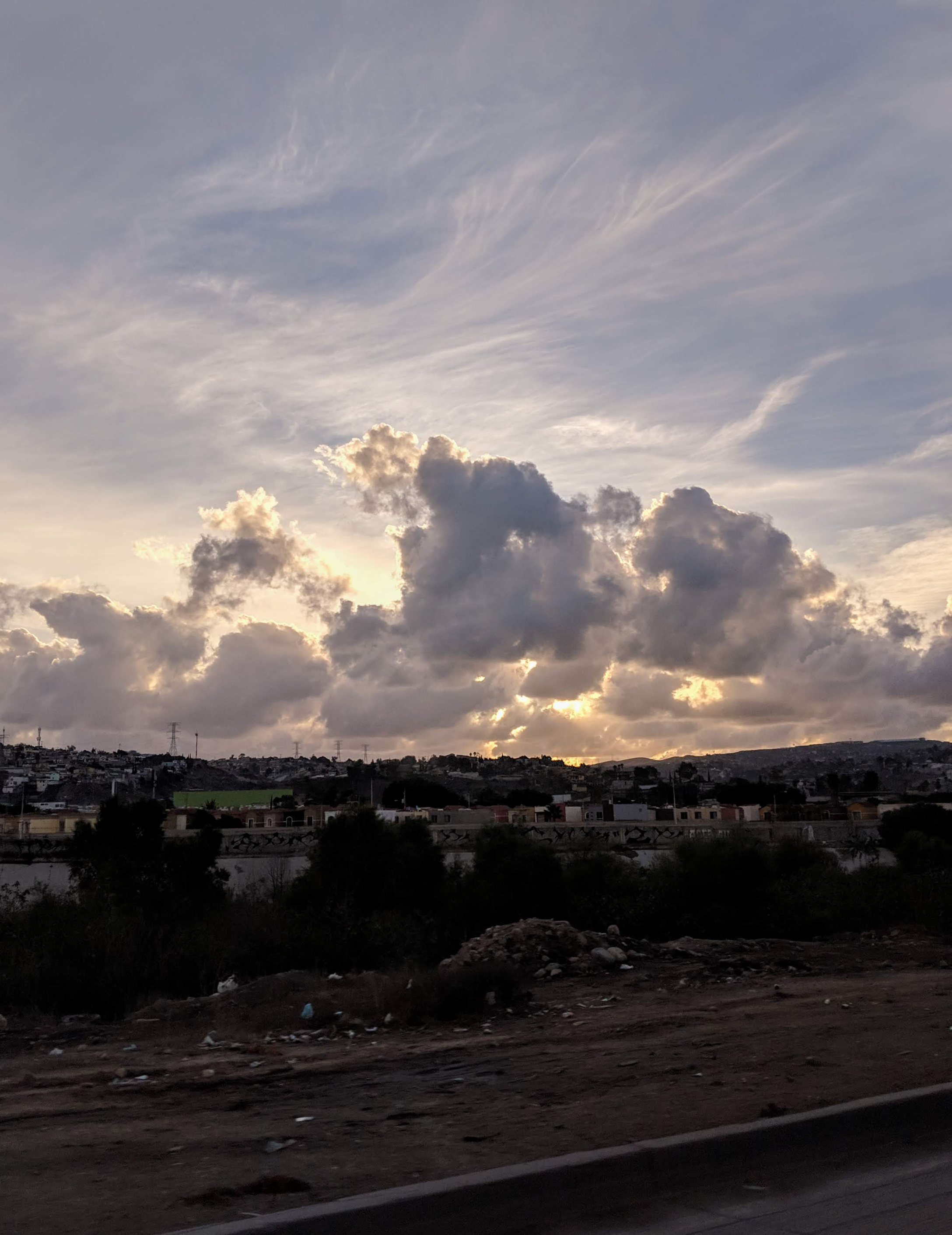 Photo: Sean Burke
Photo: Sean BurkeOne hundred yards north of the river is a huge shopping mall where you can buy discount designer handbags and cheap fast fashion; fifty yards south of the wall is a baseball field. The Unidad Deportiva Benito Juarez isn’t that remarkable, or wasn’t, until the Republican right in the USA needed a Reichstag Fire to whip up fear and racial animus before the recent midterm elections. But it’s shocking to stand up to your ankles in mud on a baseball field in Mexico with DHS helicopters buzzing overhead while a little girl asks to sit on your shoulders and see America.
People without food, water, and shelter, only 15 miles from where I live is sad; those people demonstrating dignity and resilience and being dehumanized in the media, accused of being terrorists and drug dealers, that makes me angry.
That was six weeks ago now, but every time we go back there, I buy as many Kinder eggs as I can find. Most of the people who made up the caravan are now living about 15 kilometers south of the wall, in an old concert venue and nightclub called El Barretal. In the courtyard, thousands of people live in tents; above them on a mezzanine are more, mostly young men. Some of the young guys have found an old Christmas tree long since stripped of its leaves, but they’ve dragged it up there along with an American flag and some lights that don’t turn on. Maybe next Christmas that flag will mean something different to them.
There’s a field hospital in one corner; it came when the new Mexican government sent more federal help in early December. The marines came then as well, who are now sitting outside the front gate in Humvees. International NGOs have been trickling in. First, World Central Kitchen came and began feeding warm meals to hungry people. Later, UNICEF came and set up activities and counselling for the kids. And then some people from the local government turned up, brought some megaphones and started telling everyone what to do.
El Barretal wasn’t designed as a place to live, more of a place to live it up. There’s a ticket office, a dance floor, a stage, mirrored bars and VIP rooms with balconies. They host young women now, as they probably did before, but these young women are alone or with their kids. They’re the only ones sleeping under a roof, it’s safer for them behind the doors, especially after UNICEF arrived and set up guards to keep strangers out. It’s still no place for kids, they run around on the rusted-out staircases and jump over the gaping holes in the floor. At night it’s just above freezing.
There is a little girl who finds me every time I go, even among thousands of people, so that she can braid my hair. Last month she asked me if I could bring her a teddy bear.
Even when it rains and the water flows through the tents bringing the rubbish from up the hill, there’s always someone smiling, laughing, and mocking the Castilian lisp in my Spanish. In the first few days, someone found a stray cat and managed to feed her and care for her just enough to make her feel safe. Soon enough, one pudgy cat became half a dozen kittens and one less pudgy cat. Now, little kids come up to me with their little bundles of fur and show me how they’ve grown. Just like kids anywhere they want to take care of their pets and show off their new favorite things. A few weeks ago, we got an old projector, a speaker and a bunch of DVDs. After an hour crawling around in a ceiling that looked like it came out of a Dangers of Tetanus video, we managed to find some power and set up a tiny cinema. Soon, dozens of kids were happily watching Beverly Hills Chihuahua and forgetting how cold it would get later that night.
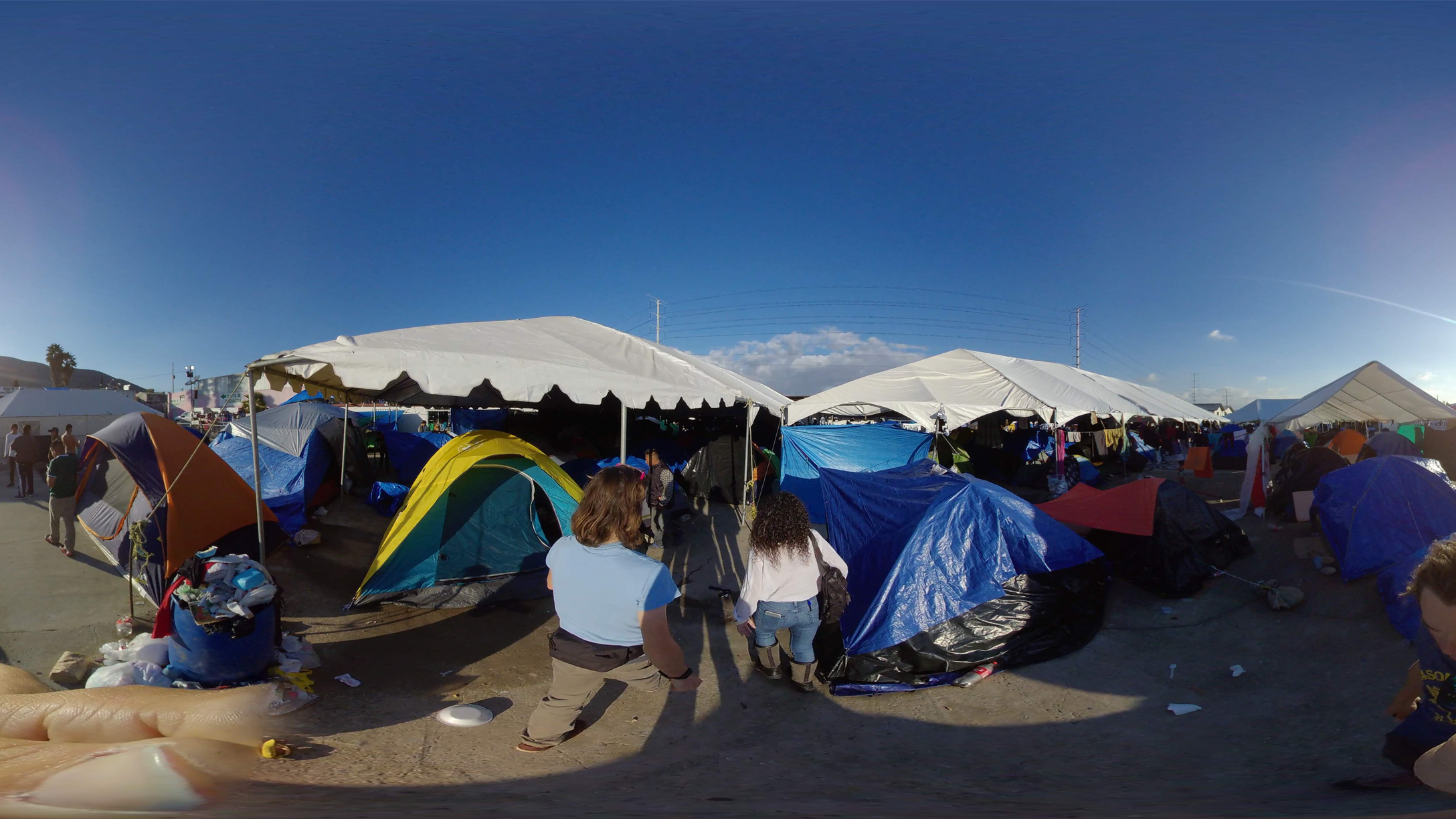 Photo: Sean Burke
Photo: Sean Burke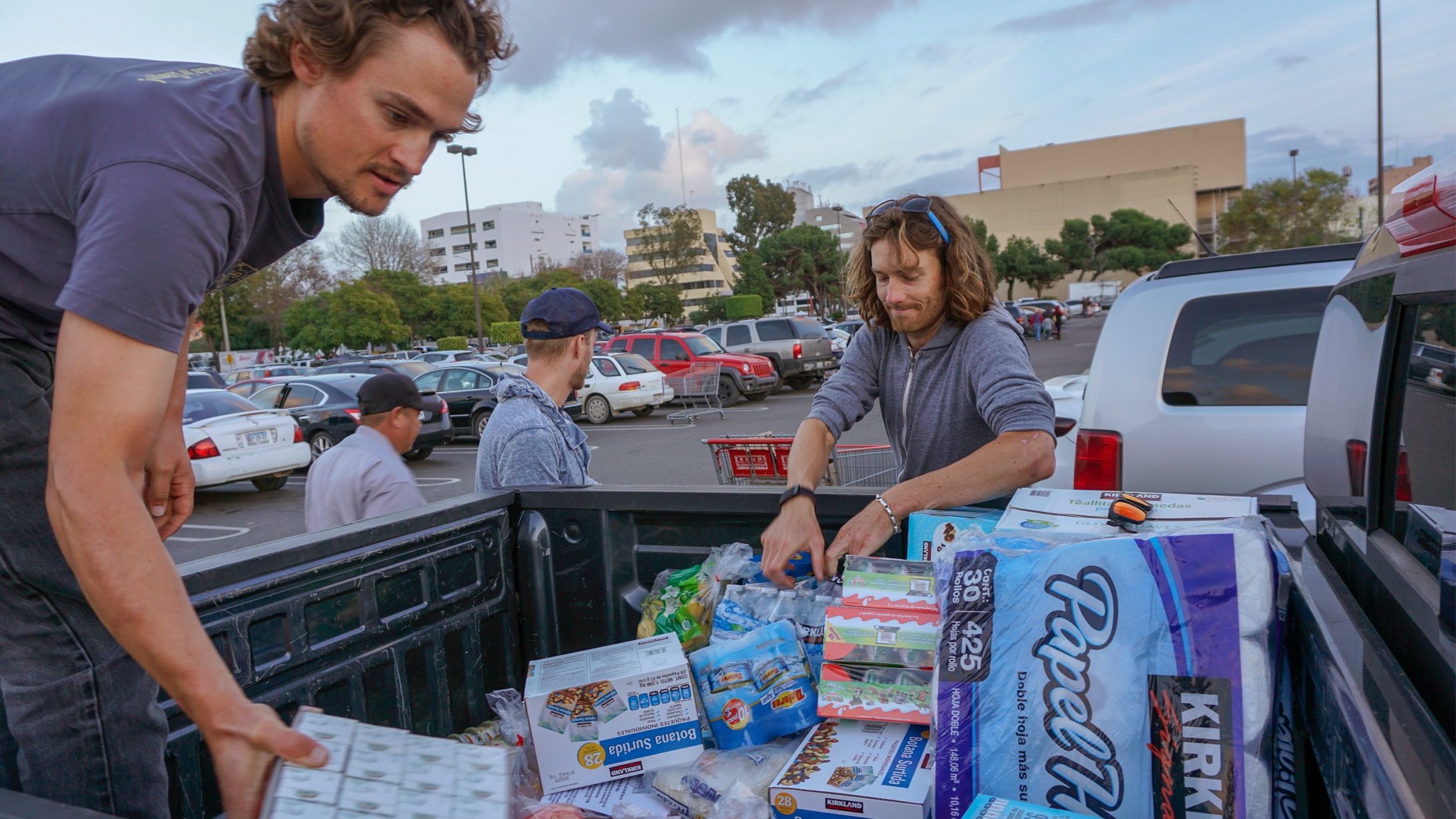
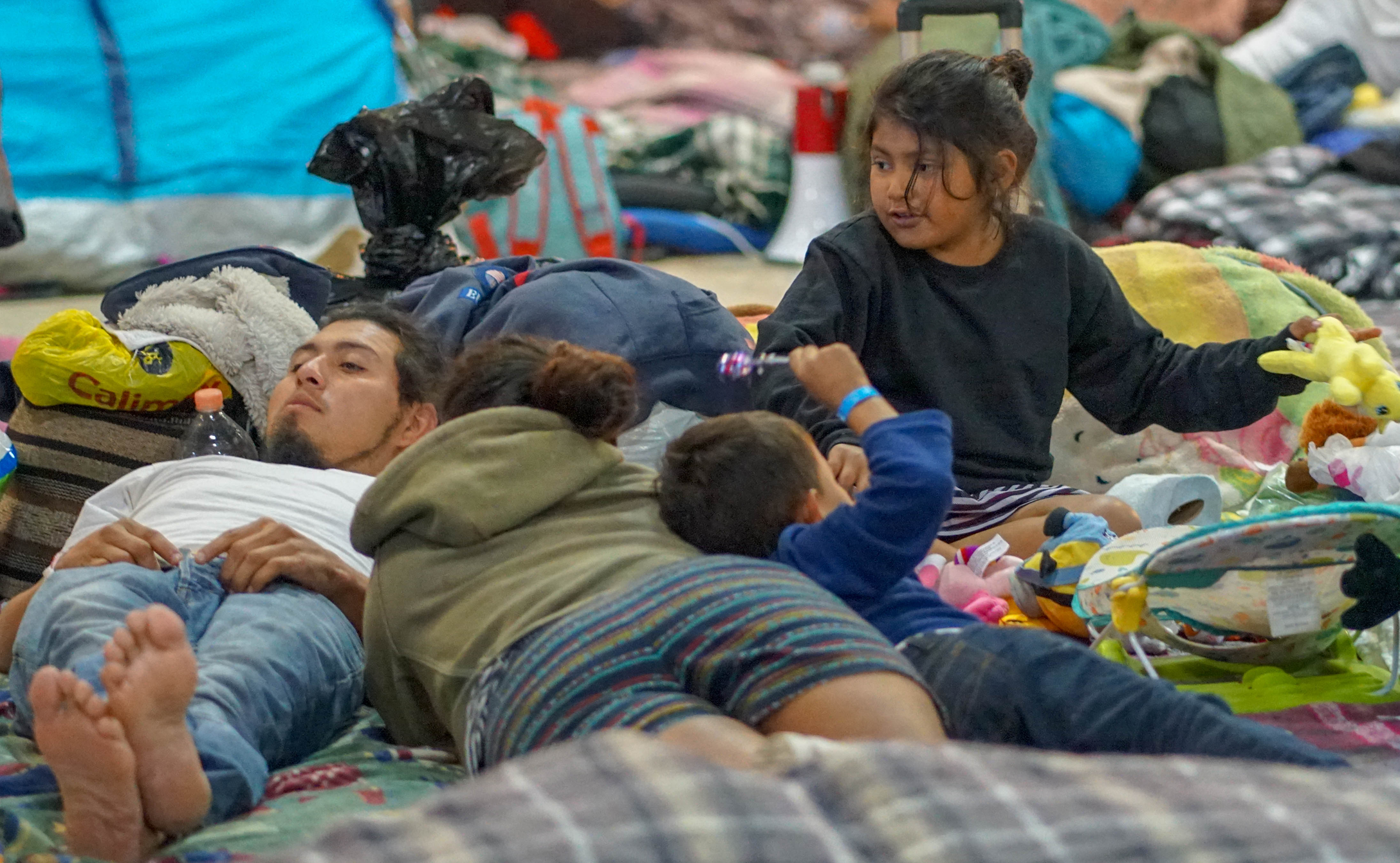
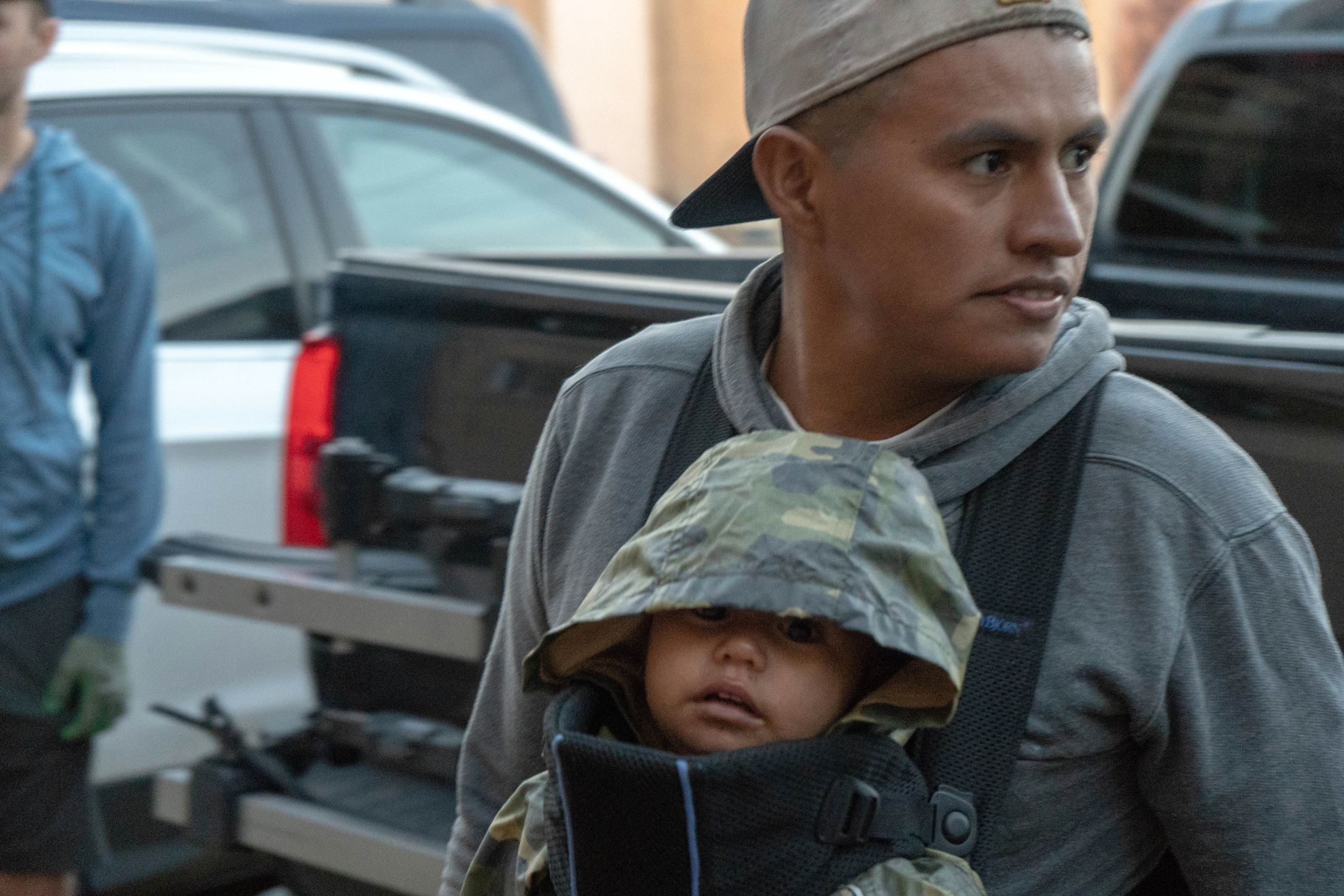
When people talk about migration, I don’t think they think about people who can’t afford shoes for their kids, because they don’t see that on the news. The first time we visited the baseball field, most of refugees there didn’t have shoes. Some wore flip flops, some wore slippers, lots had crocs for some reason. But when we asked what people wanted, they always said “shoes.”
The week before Christmas, my wife and I handed out shoes. It’s pretty disheartening when the young men come in, only to find that the smallest pair of shoes we have are four sizes too big. A volunteer suggested they wear two pairs of socks and one of the young men looked at him and reminded him that they didn’t have two pairs of socks. That made us all feel pretty small for a while.
My wife had better luck with the women’s shoes. One lady came into the donation tent with her daughter, and I helped the little girl pick out some tiny sandals while she introduced me to the raggedy doll she was carrying. My wife helped her mother, who had come into the tent in flip flops, to find a pair of rainboots. Now they were nice rainboots, but I would give away all the rainboots in the world to see anyone as happy as that woman was when she found a pair of shoes that fit. She hugged my wife, hugged me, thanked everyone in the tent and bounced off like she’d won the lottery.
I’m a historian of antifascism in the 1930s, and I often see links between my work helping refugees and my area of study. Fascism’s first iteration had its first roots in post-war melancholia, placing the needs of a nation above those of the rest of humanity. The rules of the democratic game became less important than winning it, and the world turned a blind eye as democratically elected governments were overthrown by force.
I write about Catalonia and the Spanish Civil War, a conflict in which fascists innovated new ways of killing civilians, and the democratic powers showed an equal inventiveness in their excuses for non-intervention. I think a lot about what I would have done, had I lived then; 45,000 brave volunteers fought fascism in Spain’s international brigades and I’ve always hoped that given the chance, I would do the right thing.
George Orwell, who was one of those volunteers, wrote a book about his experiences in the Spanish Civil War. He wrote, “When I see an actual flesh-and-blood worker in conflict with his natural enemy, the policeman, I do not have to ask myself which side I am on.”
Not everyone left the sports complex we first visited in late November. Some families who had walked this far didn’t want to turn around and walk south again. Others were praying, hoping that a force more powerful than the DHS helicopters we saw on our first trip would open up that wall. Still others told me that a bus full of refugees had gone missing in southern Mexico. Imagine being so desperate that you took off walking, literally carrying your children, and made it from Honduras to the U.S. Border. Getting in a bus and giving up all control after you have taken so much responsibility might not seem smart. For these and other reasons, some people stayed.
The people who stayed didn’t get the warm meals or the medical attention or the kids’ activities. Eventually they got a warehouse, one without lights or running water, but at least it was a roof. We started going there instead of El Barretal, because there was more we could do. A few times a week we’d run up a four-figure Costco bill, and take food, water, sleeping bags and shoes. The half dozen policemen guarding the area started calling me “macho” and stopped asking for ID. I have found the Federal Police at the refuge to be less militarized and a bit more working class than their colleagues in the US. The Federales seemed glad to see us, and helped us unload the truck sometimes.
So it was a shock on Friday to see the police dressed in riot gear facing off with the few hundred people left in the warehouse, and be put in mind of that Orwell line that I have on a postcard in my office. In a bizarre irony, we approvingly noted the gender diversity of the people behind the wall of plastic shields. Luckily, at the last minute a restraining order was produced, and a standoff began. It continued all weekend.
Some posturing anarchists turned up from the U.S. and tried to antagonize the police, endangering the families stuck inside. It rained, so they went home. There were rumors of the Mexican right turning up, as well. Everyone got a little tense about that, but they never came. And all weekend police in helmets that dehumanize them faced off against people in a system that dehumanizes them, while people thousands of miles away made speeches as if there weren’t little children stuck in a leaky warehouse, crying because they’re scared of the dark.
At this moment, the U.S. government is shut down because the Republican party is so afraid of the people who stood in line patiently waiting for water and granola bars. People aren’t getting paid, National Parks are being trampled over and services aren’t being provided because Donald Trump wants nearly 6 billion dollars to build a wall to keep out people like the little girl who likes to braid my hair, or the 13-year-old young man who walked all the way from Honduras on his own.
Our debates in Washington don’t reference these kids, or their parents, who routinely ask me for my address in case they can get across the border and need a place to stay. I wish everyone could walk around the refugee camp and get an education in what poverty means, what dignity looks like, and also to learn exactly how much they suck at soccer. There is no reason to build a wall to keep people out who want to come in only so that they can be safe and work, and one day, their kids will have kids who will never have to go without shoes.

